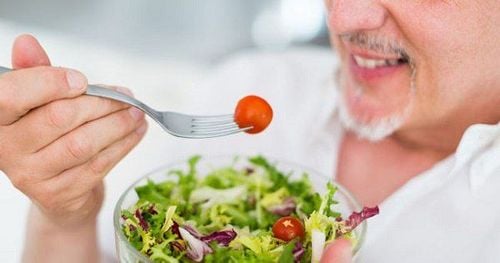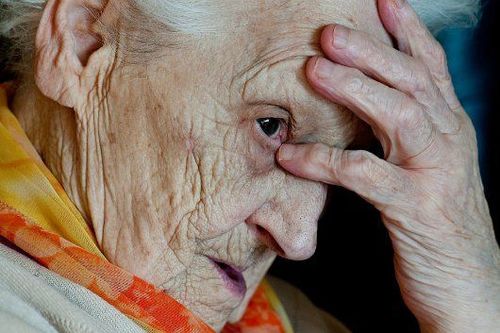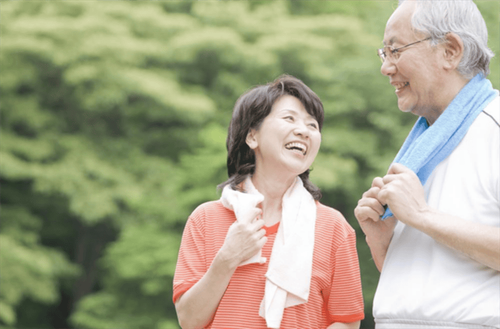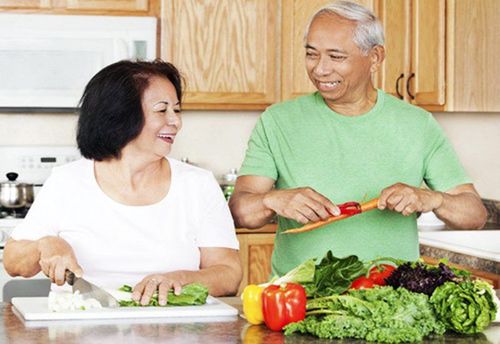This is an automatically translated article.
When taking care of the health of the elderly, nutrition is a factor that cannot be ignored. If they know how to balance nutrition for the elderly, they will have good health and an optimistic spirit.
1. Changes in the body of the elderly
When the elderly are old, the body of the elderly has changes compared to adulthood when health is still full. These changes are:
1.1 Morphological change Average height: Decrease 0.5 - 2cm/year compared to adulthood; Reduce height by 3 - 5cm if spinal disc collapse, spinal collapse. If you lose more than 6cm in height, it may be due to osteoporosis. 1.2 Changes in body composition Reducing the percentage of water in the body: At the age of 25 - 65% of the body is water; at the age of 75 - 53% of the body is water; Fat mass: At the age of 25 - the percentage of fat is 15%; at the age of 50 - the percentage of fat is 25%; Muscle mass: Much reduced, especially in people who do not exercise; The proportion of liver decreased by 18%, kidney decreased by 8.9% and lung decreased by 19.8%.

Người cao tuổi thay đổi cả hình thái lẫn thành phần cơ thể
1.3 Changes in organ structure and function Decrease appetite, tooth loss,... reduces chewing power, reduces salivation, leading to slow digestion of food; The stomach is shrinking, reducing contractility, reducing secretion of gastric juice, leading to a decrease in the ability to digest and absorb nutrients such as calcium, vitamin B12,...; Decrease intestinal motility, easy to cause flatulence, indigestion, constipation,...; Decreased liver and biliary function; Structural fibrosis of the heart and blood vessels, causing thickening and dilation of the heart wall, degeneration of heart valves, hardening of the arteries,... reducing cardiac output and increasing arterial pressure,... leading to arrhythmias heart , valvular disease , hypertension , heart failure ,...; Reduced glomerular filtration rate, increased risk of renal failure, renal fibrosis, prostate enlargement causing urinary retention, infection,...; Decreased respiratory function due to changes in the lungs and thorax; Decreased immune function of the body, less antibody response when vaccinated, prone to bacterial infections; Degeneration of the nervous system leads to memory loss; Have a higher risk of cancer than young people; Impaired glucose tolerance, increased risk of diabetes; Osteoarthritis, osteoporosis, increased risk of falls. 1.4 Changes in the function of metabolism of energy and nutrients Energy metabolism: Energy requirements are reduced by about 30% compared to young people because of reduced muscle mass and less activity; Protein: The ability to digest and absorb protein is poor, and the liver's ability to synthesize albumin is reduced, so the elderly are often deficient in protein. On the contrary, in the case of eating too much meat, the decomposition of meat will occur in the colon, fermenting, creating toxic substances harmful to the body; Carbohydrates: Elderly people have reduced tolerance to sweets, are at high risk of diabetes because the pancreas reduces insulin production and may be resistant to insulin;
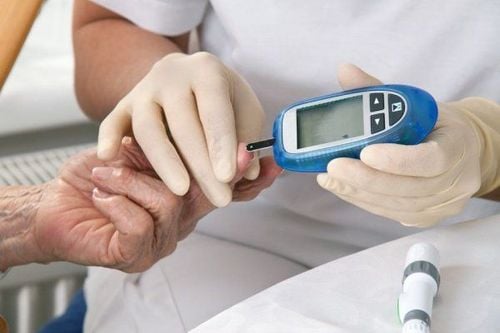
Người già có nguy cơ cao mắc đái tháo đường
Fat: Reduces the activity of lipase - an enzyme that breaks down fat - so the elderly have a high risk of hyperlipidemia; Water: Reduced sensitivity to thirst, so the elderly are at risk of dehydration; Vitamins: Elderly people often get less sunlight, so their ability to synthesize vitamin D3 (synthesized by the skin when exposed to sunlight) is lower than younger people.
2. Building nutrition for the elderly
Changes in nutrition in the elderly can affect the body's mechanism of food absorption, nutritional needs and taste. Therefore, when formulating a diet for the elderly, it is necessary to pay attention to the following:
2.1 Principles of nutrition for the elderly. Dietary needs and balance of nutrients include: Protein , fat, starch, vitamins, minerals, water and fiber; Processing food that is easy to digest, should have soup in the meal; Do not skip any meals during the day; Have a menu plan, monitor and evaluate meals; Track your weight, waist circumference, body fat percentage. 2.2 About the diet Compared to the 25-year-old, the 60-year-old's energy requirement decreased by 20%, the over-70-year-old's decreased by 30%. According to recommendations for Vietnamese people, it is necessary to maintain the energy requirement for the elderly at 1700-1900 calories/person/day. Regarding the proportion of groups of substances, energy from cereals accounts for 68%, fat accounts for 18% and protein provides 14% of total energy requirements in the daily diet. The adjustment of the diet for the elderly needs to be reasonable, maintaining a healthy BMI of 18.5 - 22.9.

Điều chỉnh chế độ ăn để đảm bảo chỉ số BMI phù hợp ở người cao tuổi
2.3 About starch, protein, fat and salt Starch: Should be eaten in moderation. Each meal for the elderly should only eat 1-2 bowls of rice, eat more potatoes, cassava tubers to provide fiber to prevent constipation. Protein: The average protein requirement of the elderly is about 60-70g/day, of which animal protein accounts for 30% of the protein intake. Elderly people should reduce red meat, increase calcium-rich foods (fish, shrimp, crab) and vegetable protein (beans, sesame, peanuts, tofu,...). At the same time, it is necessary to limit foods high in cholesterol such as brains, skin, and animal organs. Should eat more fish, yogurt and limit the number of eggs to 3 eggs/week; Fat: Eat both animal fats and vegetable oils. The percentage of fat from plants should be 35% of the total fat. Vegetable oils have no cholesterol and less saturated fatty acids than animal fats, so they are good for people with high blood pressure and other cardiovascular diseases; Salt: Limit foods with high salt content such as pickles, salted tomatoes, processed foods. Salt intake should be controlled at less than 150g/person/month because eating a lot of salt will aggravate high blood pressure. 2.4 About fiber, water and minerals Fiber: The need for fiber of the elderly is 25g/day. Soluble fiber has the effect of lowering cholesterol and blood sugar, good for patients with diabetes and hypertension. At the same time, fiber also stimulates bowel movements, avoids constipation, prevents atherosclerosis. Therefore, the elderly should eat green vegetables and fruits rich in vitamins and minerals. If possible, each day should eat about 300g of green vegetables and 100g of fruit; Water: Elderly people often drink less water for fear of frequent urination at night, causing insomnia. Meanwhile, water has a great use in supporting digestion, eliminating waste products from the body. Therefore, the elderly should drink enough 1.5-2 liters of water/day, actively drink water even when not thirsty. In addition, water such as green tea, lotus tea, lotus root tea, ... are also very good for the elderly; Vitamins and minerals: Should add foods rich in vitamins of groups B, C, D, ... and important minerals such as calcium, iron, zinc, ... to enhance resistance.
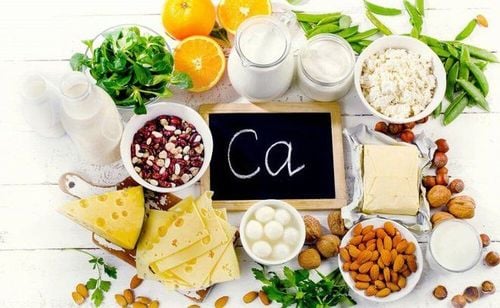
Bổ sung nhiều thực phẩm chứa vitamin và khoáng chất
2.5 Some notes in the elderly's nutrition. Should drink 1 glass of low-fat, low-sugar milk per day to fully replenish the body's nutrients; Live in moderation, eat and sleep on time, combine exercise for better digestion and improve health; Divide meals into many small meals throughout the day and create a happy and comfortable atmosphere when eating; When eating should eat slowly, chew thoroughly; Prioritize the processing of steamed and boiled dishes instead of fried and grilled dishes to reduce cholesterol absorption and make digestion easier; It is necessary to change the menu regularly, avoid the menu too monotonous to eat more deliciously; It is recommended to process soft, mushy, and finely chopped foods for easier chewing and digestion; Do not overeat, especially in the evening; Choose foods according to pathology: Some people have chronic diseases such as diabetes, high blood pressure, etc., so it is necessary to choose the right foods that are suitable for disease control. Specifically, celery, cucumber, tomato, squash, sweet potato, lettuce, wood ear, bean sprouts, ... help prevent hypertension and heart disease. Good foods for diabetics include zucchini, red water spinach, water spinach, artichoke flowers, bitter melon,...; After eating, you should sit in place or walk gently for 30 minutes to help the stomach mix food, easier to digest. Elderly people should have a reasonable diet, keep their spirits up and maintain moderate exercise to improve health, slow down the aging process and have a longer life expectancy.
SEE MORE
Some notes on food hygiene and safety Nutritional composition of hot vegetables Nutritional value of pork




